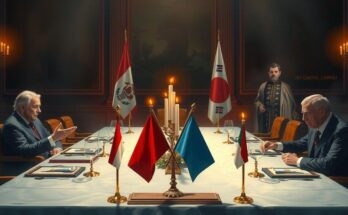Political parties in Mali have filed court petitions against a military government ban on their operations. The junta’s recent ban on political activities incites legal challenges as parties claim it infringes on freedoms guaranteed by the constitution. Amidst increasing restrictions on civil liberties, Mali faces calls for a new electoral process and the restoration of civilian rule.
Political parties in Mali have initiated a court petition disputing the military government’s recent ban on their operations. According to a statement issued to the AFP on Wednesday, the junta, led by General Assimi Goita, announced earlier this month the dissolution of all political parties and organizations, along with a prohibition on meetings. The unprecedented move has sparked a legal dispute that could have significant implications for the country’s political future.
In a coordinated effort, the political parties have filed legal appeals in six different high courts within the Bamako district, and they have also submitted a parallel appeal to the administrative section of the Supreme Court. The core aim of these submissions is to contest the legitimacy of the decree that led to their dissolution as well as to address its ongoing implications for political engagement in Mali.
The parties argue that the ban represents a severe violation of fundamental rights, including the freedom of association and assembly, which are essential for public participation in political life. Currently, about 300 political groups operate within Mali, and the junta has claimed that this dissolution is part of an effort to streamline the number of parties.
This action is the latest in a series of civil liberty restrictions imposed by the military, which came to power following coups in 2020 and 2021. In fact, a national consultation organized by the junta at the end of April proposed the disbandment of political parties and introduced more stringent regulations for their establishment and operation.
Moreover, the junta’s consultation suggested extending General Goita’s presidency to a renewable five-year term. This recommendation stands in stark contrast to a previous promise to restore civilian rule by March of last year. In response to these developments, a group of Malian writers, lawyers, and economists released an opinion piece denouncing the junta’s actions as violations of “fundamental rights in the country.”
In their statement, they urged the military leadership to collaborate with all sectors of Malian society to establish a new electoral calendar that would encompass both the presidential and legislative elections. They stressed the necessity of setting this timeline within a short period. Furthermore, they have demanded the release of all “prisoners of conscience” who have been detained under the junta’s regime.
The Malian constitution of 1992, which was reaffirmed by the junta in 2023, guarantees the rights to multipartyism, freedom of expression, and association. However, the nation has faced significant turmoil since 2012, as violence has surged due to insurgency linked to Al-Qaeda and local criminal factions. As these developments unfold, the political climate in Mali remains fraught with uncertainty.
In conclusion, Mali’s political landscape faces significant upheaval as parties challenge the military’s recent ban on their operations. The court petitions reflect a deep-seated concern about the erosion of civil liberties and fundamental rights. With a backdrop of ongoing violence and a history of military rule, Mali’s future political order remains uncertain, especially as calls for dialogue and restoration of civilian governance intensify among civil society actors.
Original Source: www.trt.global




